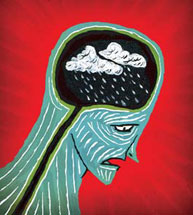
Depression hasn’t always been taken very seriously. People used to downplay it—nothing that a stiff upper lip and a carton of Häagen-Dazs couldn’t cure—but two recent studies show how this profoundly debilitating and complex condition can influence, and be influenced by, how our bodies function.
According to a recent study co-authored by scientists from McGill and Université de Montréal, patients with coronary artery disease who are also experiencing depression or high levels of anxiety run twice the risk of suffering a repeated heart hospitalization. “On average, cardiac patients without these disorders had about a 13 per cent chance of a repeated cardiac event over two years, compared to 26 per cent of those with either major depression or generalized anxiety disorder,” explains principal investigator Nancy Frasure-Smith, a professor with McGill’s Department of Psychiatry and a researcher at the Montreal Heart Institute and the Centre Hospitalier de l’Université de Montréal.
The study, published in Archives of General Psychiatry, focused on patients with stable coronary artery disease—not those recently hospitalized for severe conditions such as a heart attack. “This is the first study to demonstrate that anxiety and depression can have a strong impact on people with stable coronary artery disease,” notes Frasure-Smith’s research collaborator, Université de Montréal psychiatry professor François Lespérance.
The research team interviewed more than 800 patients with stable coronary artery disease who were being monitored by a doctor. “Now that we know that anxiety and major depression are both markers of increased cardiac risk, it is imperative that these patients receive the best treatment for both their cardiac and psychiatric conditions,” the study concludes.
In another recent study, also published in Archives of General Psychiatry, researchers at McGill’s Montreal Neurological Institute have identified the neurological basis of depression in male athletes who have suffered concussions. In addition to other symptoms (such as attention and memory problems and fatigue), athletes recovering from concussive injuries frequently experience depression. While only about 5 per cent of the general public experiences serious depression, up to 40 per cent of head trauma patients may suffer from symptoms of depression.
“Until now, very little was known about the neurological basis of the depression frequently reported by athletes following concussion,” says MNI neuropsychologist Alain Ptito, the lead investigator for the study. Ptito’s team used functional MRI (fMRI), a computerized imaging technique that measures blood oxygen levels, to examine 56 male athletes, 40 of whom had concussions, and 16 who were concussion-free. Concussed athletes with depression presented with the same pattern of brain activation as that seen for patients with major depression, specifically in the dorsolateral prefrontal cortex and striatum and attenuated deactivation in medial frontal and temporal regions consistent with a limbic-frontal model of depression. The researchers suggest that symptoms of depression following head trauma may share the same underlying neural mechanism as major depression. Ptito believes this finding indicates a close link between the concussion-inflicted brain damage and post-concussion depression and has important implications for pharmacological and/or psychological treatments.
Frasure-Smith’s research is supported by CIHR, GlaxoSmithKline, the Charles A. Dana Foundation, the Foundation of the Montreal Heart Institute, the Pierre David Fund and the Fondation du Centre Hospitalier de l’Université de Montréal. Ptito’s study is funded by CIHR and the Fonds de la recherche en santé du Québec.
